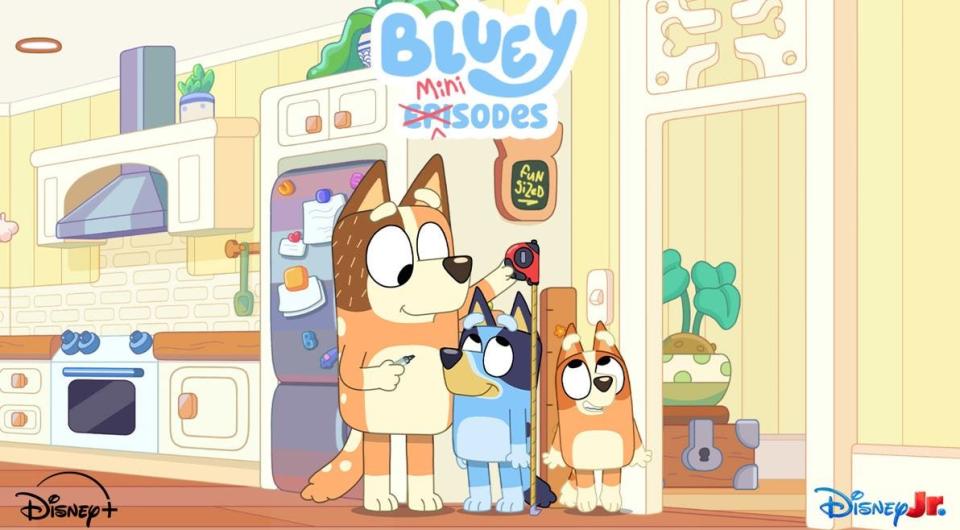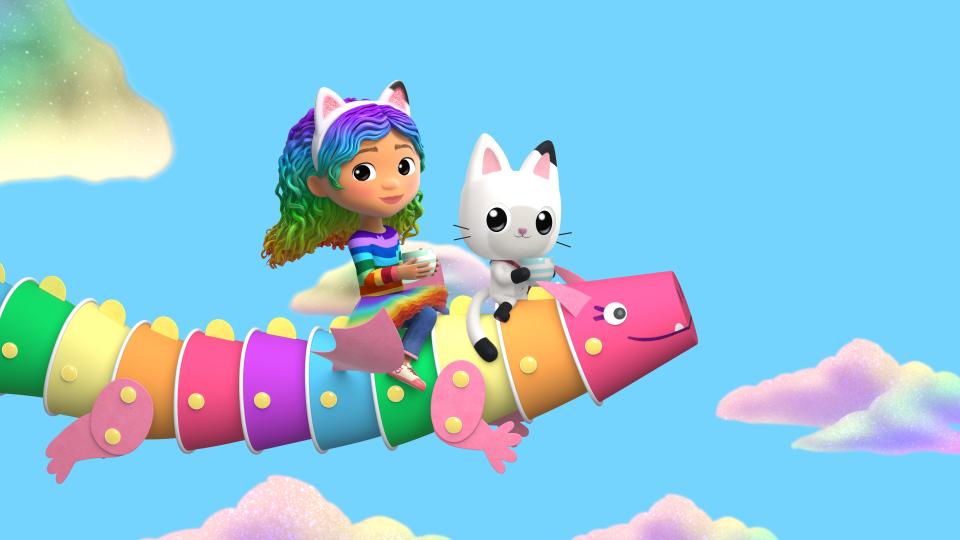How much TV is OK for little kids? A judgment-free guide for families
It’s 5:30 p.m. on a Wednesday. Dinner isn’t ready, your partner isn’t home yet and two needy little kids won’t let you chop an onion. What’s a parent to do?
Consider the TV, potentially the most helpful (and most controversial) parenting tool available in 2024. When it comes to screens, a hundred different opinions are competing for space in stressed-out-parents' minds. The pediatrician says one thing, Grandma says another, and social media makes you feel as if you’re a bad parent no matter what choice you make.
Meanwhile, kids' TV shows have never had a higher profile. Disney+'s "Bluey," which returns with three-minute "minisodes" this month, has taken over the zeitgeist.

As summer gets hotter and child care is more out of reach financially and logistically for many families, TV can be a big help. Debates about kids' screen time are nothing new. But after a few years of pandemic-related quiet, the conversation is reaching a fever pitch again, particularly on social media. "As a working mom. I think that a lot of people are super-judgmental about screen time," says Dr. Dyan Hes, a pediatrician at Lenox Hill Hospital in New York. "So many people are giving parenting advice − they're not qualified to do it − and making people really second-guess themselves as parents."
Parents want to know the right answer. The problem is there's no right answer for every family. But here's what experts say about how much and what screen time is good for kids; what parents say about how screen time affects their lives; and what the people who make the shows that entertain your kids say, too. There's far more nuance here than one-minute TikToks insisting TV will melt kids' brains would indicate.
Is screen time bad for kids? How much screen time is OK for toddlers and preschoolers?
The American Academy of Pediatrics discourages kids from using any screen time − TV, computers or otherwise − under 18 months old, except for FaceTime or other video chatting. For those 18 to 24 months, they recommend a limited number of “high quality” programs watched alongside a parent or caregiver. And for ages 2 to 5, they advise limiting screen time to one hour a day, avoiding mealtimes and the hour before bedtime.
That seems simple and clear cut, right? Well, not always.
“One hour is probably achievable for some families and probably impossible for others,” says Ash Brandin, a veteran teacher who posts realistic advice about screen time on Instagram as thegamereducator. “I would encourage families to ask themselves, ‘Is this screen time benefiting everyone in my family?’ If you are allowing 45 minutes of TV but it routinely ends in meltdowns, then that might not be sustainable. Another family may have 90 minutes a day but they break it up, mix in opportunities for physical movement and independent play, and find that the screen time allows adults to meet their family's needs.”
Recommendations from experts, like those from the AAP, are often presented without a “why” attached to them. For babies under 18 months, the concern is that time in front of a screen can supplant time moving and interacting with the real world, thus limiting opportunities for the child to develop cognitive and motor skills. For older toddlers and preschoolers, the AAP says studies show “associations between excessive television viewing in early childhood and cognitive language and social/emotional delays.” But a big caveat is that better content leads to better outcomes.
Dr. Kathryn Hecht, a child psychologist and the mother of a toddler and infant in Minneapolis, worries about the “opportunity cost” of TV time. “If you’re watching TV, you’re not interacting with others. You’re not moving your body,” she says. “You’re not exercising your own imagination or creativity, because the story is being fed to you, plot twists and all.”
But for her, like so many parents, real life has real needs. “That said, all bets are off if a kid is sick,” Hecht adds, noting that her daughter recently had a stomach bug and is enjoying her saltines with an episode of “Dora the Explorer.”
Jennifer Cross, a pediatric behavior and development specialist at New York Presbyterian Hospital, says the one-hour-a-day rule is “certainly aspirational, and some people keep it. Four hours is too much, right? But if (kids) watch an hour in the morning while the parents are getting ready for work and in the evening they watch another half-hour show with their parents, I think that's certainly OK, too.”
Are some TV shows better for little kids than others?
“There's just so much to choose from that it's so difficult to find what's really beneficial,” Sara DeWitt, senior VP and general manager of PBS Kids, says of today's children’s entertainment landscape. At PBS, "we're looking for things that are going to get kids passionate about learning."
But not every show has the educational mandate of public television. Hundreds of shows on dozens of platforms compete for kids' short attention spans. Among traditional offerings are shows airing on PBS, Disney Junior and Nickelodeon, streaming on Netflix, Disney+, Amazon and Apple TV+, and the unchecked and daunting world of YouTube and other creator-uploaded content.
Research tells us that kids under 2 can’t learn from a screen, but older kids can. And “educational content” isn’t limited to learning your letters on “Sesame Street" (although that classic still is a great boon to kids half a century into its run). Children can learn social and emotional lessons from stories too. PBS' “Daniel Tiger's Neighborhood," based on a "Mister Rogers Neighborhood" character, can help kids get over the fear of change or remember their potty training. Each episode has "little songs about the social or emotional learning skills," says Chris Loggins, a supervising producer. Pediatric experts work with writers to create teaching concepts. "Our ideas are a collaborative effort between our writing team, Fred Rogers Productions and our child development advisers."
Join our Watch Party! Sign up to receive USA TODAY's movie and TV recommendations right in your inbox
Netflix’s rocking and pink “Gabby’s Dollhouse” is built around the psychological framework of “growth mindset,” which is about learning from our mistakes.
“We love the idea that you can teach preschoolers to have a growth mindset,” says Traci Paige Johnson, co-creator of “Gabby’s.” She says the series bases its “DNA” on a book about the concept by Dr. Carol Dweck, and a researcher helps with scripts and stories. On Gabby’s it’s OK if kids “don't know something yet. We celebrate mistakes and failing fantastically.”
Even teaching “prosocial” behavior is helpful to show “kids being nice to each other as opposed to fighting each other,” says Cross, the pediatrician. Series should show the characters being kind and compassionate all the time ("Caillou," the Canadian preschool show every parent loves to hate, is often criticized for showing its lead character perform the opposite of this behavior.)
"I love the shows that teach good lessons about socio-emotional learning or that have an educational message," says Angela Narayan, who has a 5- and 3-year-old in Denver. "All shows teach the viewers something, but it might not be something that parents really want children to learn."
Does pacing, animation style or color make a difference?
On social media, self-proclaimed experts in screen time point to 3D animation, fast scene transitions, neon colors or blaring soundtracks as “bad” for kids, but those opinions aren’t based in research. For some kids, those elements can be overstimulating, but not for others.
“It's all moderation,” says Dr. Alison Yeung, a family doctor in Kitchener-Waterloo, Ontario, who advises families on screen time use. She says some screen time with bright, 3D and loud content is fine, depending on your kid's temperament. “You have to know your child. Some kids will be just fine with that and they'll transition easily. If certain types of content are too overstimulating and there's a huge fight every time you try to transition to something else, then you may have to pull back.”
PBS' DeWitt echoes those suggestions. “What is the moment that you're going to be using screen time, and how do you want your child to be interacting with that screen time?” While putting a baby down for a nap, “is it super-wise (to put on) a show where kids are going to yell back to the TV?”

What your kids watch matters, and can even be helpful
Just like adults, stories about people and places beyond children's experiences can open their eyes. Brittany Hinds, who has two children in Jackson, Tennessee, worries about the diversity of characters in the shows her kids watch. "As (my daughter) got older and was exposed to more TV shows through family and friends, I became more concerned with content and messaging."
Mallory Mbalia, a former early-childhood educator who's now director of learning and education at Fred Rogers Productions, says watching your kids’ favorite shows with them can create a “common language."
"If kids connect with the content, it creates opportunities for learning connections and extensions,” she says. Mbalia once sang a song from “Daniel Tiger” when her daughter, then 4, struggled with anxiety at school drop-off. “She hugged me, smiled and skipped into the room. She had this connection with Daniel. Daniel had this problem. Daniel solved it this way. Daniel was able to handle that situation. She connected it to herself and she applied it in her context.”
TV can be a happy part of family life, not just a stressful one, DeWitt says.
"There is a lot of value in parents and kids sitting down and watching something together," she says. "That is a family experience. So think about how you make media a positive thing, instead of being something that you're always trying to manage or worry about."
"What are the things that make us all laugh? What are the things that help my kids calm down? How do you (make it) really joyful?"
This article originally appeared on USA TODAY: Screen time: How much is OK for kids, babies?


